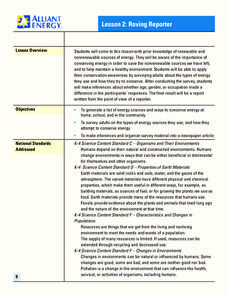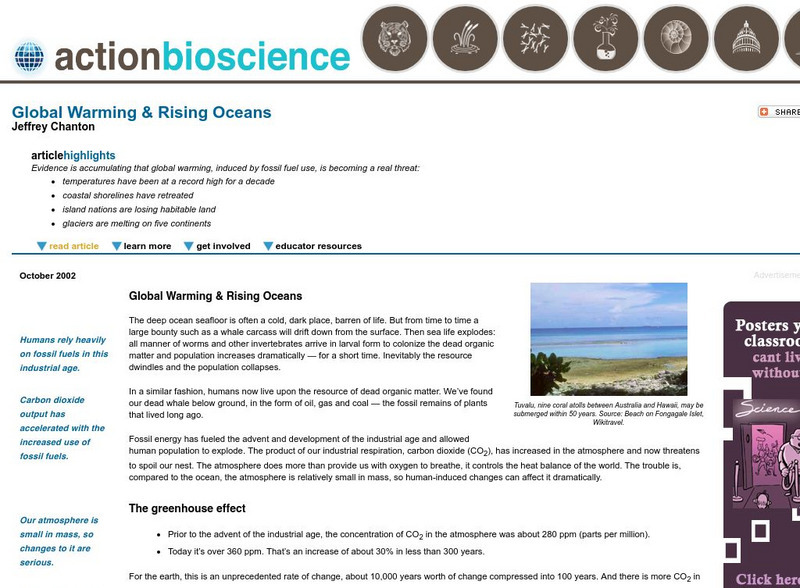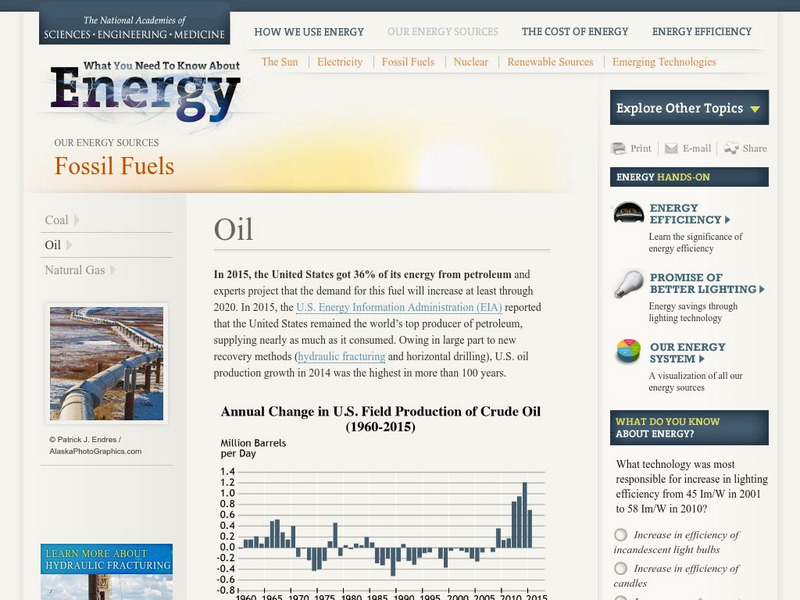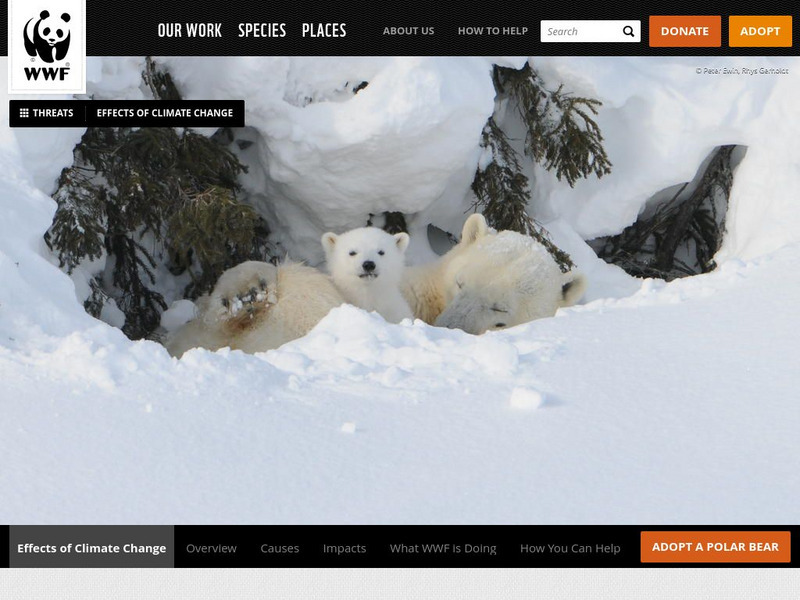Curated OER
The Chemistry of Coal
Students investigate the chemistry of coal. This lesson serves as a review of conservation of mass, simple reactions and equation balancing. During the lesson, students research chemical components of coal, as well as environmental...
Curated OER
Energy Efficiency Ambassadors
High schoolers research and compare two products that provide the same function but require different amounts of energy to do the job. They examine and demonstrate energy efficiency and discover how it applies to different technologies...
Curated OER
Powering a Green Earth
Learners compare and contrast renewable and nonrenewable energy. In this environmental science lesson, students discuss the importance of going green. They identify the different components in a power grid system.
Curated OER
Roving Reporter
Students write a report about energy use. In this conservation lesson, students interview adults about their use of renewable and nonrenewable energy. Students synthesize this information and write a report from the point of view of a...
American Institute of Biological Sciences
Action Bioscience: Rethinking Fossil Fuels
Find out how fossil fuels impact the environment and cause climate change.
John Wiley & Sons
Environet: Fossil Fuels & the Environment
A case study approach on fossil fuels is provided along with an objectives and question and answer section in learning more about this environmental subject.
Scholastic
Scholastic: Study Jams! Science: Energy, Light and Sound: Fossil Fuels
A slideshow and a short quiz on the types of fossil fuels we use and the impact this has on the environment.
National Geographic
National Geographic: Human Impacts on the Environment
Humans impact the physical environment in many ways: overpopulation, pollution, burning fossil fuels, and deforestation. Changes like these have triggered climate change, soil erosion, poor air quality, and undrinkable water. These...
PBS
Pbs: Energy and the Environment
This site is devoted to the environmental record of the George W. Bush Administration. It examines everything from nuclear energy and waste to better fuel efficiency in SUVs.
Christian Science Monitor
Cs Monitor: Why One Town in Oil Rich Texas Is Ditching Fossil Fuels
The city of Georgetown in Texas has decided that it is more economically feasible for them to meet their energy needs using renewable energy resources. Learn the rationale behind this unusual decision in an oil-rich state. (Published:...
US Department of Energy
U.s. Department of Energy: Coal: Our Most Abundant Fuel
The U.S. has enough coal to last for the next 200-300 years. So why are we not using more of it? This article describes the different types or "ranks" of coal, the history, and the problems with burning coal for energy.
American Museum of Natural History
American Museum of Natural History: Ology: Rising Co2! What Can We Do?
With this resource, students learn how much fossil fuel emissions have increased since 1600 by exploring a graph showing carbon dioxide in our atmosphere. Then answer questions and read facts about climate change over the centuries....
National Academies of Sciences, Engineering, and Medicine
The National Academies: Our Energy Sources: Natural Gas
Energy production from natural gas is less destructive to the environment than energy produced from coal, but it is still produced from fossil fuels. While advances have been made in reducing its detrimental effects, our resources are...
BBC
Bbc: Gcse Bitesize: Damage to the Environment
The atmosphere has not always been the same. It has been much the same, but nevertheless now contains more nitrogen and oxygen, and less carbon dioxide, than it did when the earth first formed. Recently, the addition of greenhouse gases...
American Institute of Biological Sciences
Action Bioscience: Global Warming & Rising Oceans
Overuse of fossil fuels has exploited the threat of global warming on Earth. This article features the details of the threat and provides additional resources.
US Energy Information Administration
U.s. Eia Energy Kids: Nonrenewable Oil (Petroleum)
Provides good information about oil made from petroleum. Covers production, offshore drilling, fuel products made from crude oil, the refining process, and environmental issues. Includes helpful charts and maps.
The Environmental Literacy Council
Environmental Literacy Council: Petroleum
Petroleum and petroleum-based products have played an impressive role as energy for the 20th century. Learn about its uses, benefits, increased consumption, effects on our environment, and the many new replacement technologies.
National Academies of Sciences, Engineering, and Medicine
The National Academies: Our Energy Sources: Oil
The United States has a huge dependency on oil as an energy source. Efforts are being made to reduce this for many reasons, the main ones being the security of this source and the impact on the environment. Transportation is one area...
Other
Planet Ark: World Environmental News
Welcome to Planet Ark's daily Reuters World Environment News - the most comprehensive source of environmental news on the Net. To read previous news stories, please use the search engine below to find stories relating to any...
PBS
Pbs Learning Media: Solar House
In this What's Up in the Environment? video segment, an electrical engineer in Virginia and his 13-year-old son explain how they produce electricity in their home. [3:58]
Other
World Wildlife Fund: Climate Change
The World Wildlife Fund offers a comprehensive overview of climate change, also known as "Global warming." Content includes basic information about the process and its effect on the environment, the science to back it up, conservation...
US Environmental Protection Agency
Epa: Land, Waste, and Cleanup Topics
This site is loaded with information on solid waste and hazardous waste. It includes industries' effects on the environment, waste programs, treatment, control, pollution prevention, recycling, and cleanup programs.
The Franklin Institute
As the Drill Bit Turns
Is the world running out of gas? Teach your students how their lives impact the depletion of non-renewable resources, specifically oil, and how the depletion of those resources will effect the future.
TED Talks
Ted: Ted Ed: A 40 Year Plan for Energy
In this intimate talk filmed at TED's offices, energy innovator Amory Lovins shows how to get the US off oil and coal by 2050, $5 trillion cheaper, with no Act of Congress, led by business for profit. The key is integrating all four...





















